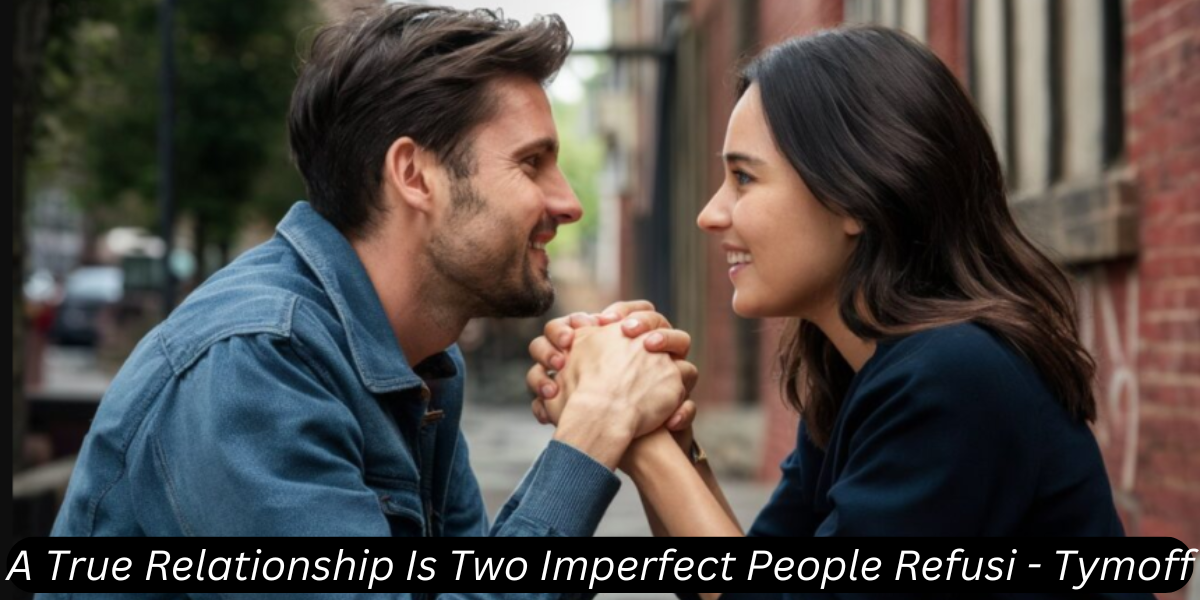
In today’s fast-paced world, relationships are often idealized, with many people searching for perfection in their partners. However, the essence of a true relationship lies in accepting that both individuals are inherently imperfect. The phrase, “a true relationship is two imperfect people refusi – tymoff to give up,” beautifully captures the essence of love that lasts through thick and thin. It highlights the value of persistence, empathy, and shared growth.
This article dives deep into what makes relationships work, explores how embracing imperfection is vital for long-term success, and outlines the habits that lead to emotional fulfillment. Whether you are in a new relationship or working on strengthening a long-term bond, these insights will inspire you to cherish love in all its messy, imperfect beauty.
What Does It Mean to Be Imperfect?
Imperfection is Natural
No one comes into a relationship as a flawless individual. Imperfection is part of the human condition, arising from personal experiences, upbringing, insecurities, and failures. It manifests in different ways—whether as bad habits, emotional insecurities, or moments of miscommunication. The key to a healthy relationship is not eradicating these imperfections but learning to navigate them with kindness and patience.
Rather than seeing flaws as obstacles, it’s crucial to acknowledge that they are part of being human. Struggles, insecurities, and differences allow people to grow individually and within their partnerships. Once both partners realize they are not in the relationship to perfect each other but to love each other in spite of their shortcomings, the bond becomes more meaningful.
Perfection is a Myth in Relationships

Unrealistic Expectations Can Hurt Love
Modern media plays a significant role in setting unrealistic expectations for relationships. Social media feeds, movies, and celebrity culture often depict an image of perfect partners living conflict-free lives. While this may look ideal from the outside, the reality is far from it. Every relationship—no matter how good—has moments of conflict, misunderstandings, and emotional struggles.
The problem with striving for perfection in love is that it can lead to disillusionment. When one or both partners expect their relationship to mirror idealized fantasies, they may feel let down during tough times. As a result, they might start questioning the relationship instead of working through challenges. Learning to manage expectations is essential to developing a relationship that thrives on authenticity rather than fantasy.
The Importance of Commitment in Lasting Love
What Does Refusing to Give Up Mean?
Refusing to give up is not about tolerating toxic behavior or staying in an unhealthy relationship. Instead, it means recognizing that challenges are inevitable, and working through them is part of building a lasting bond. It’s about choosing love repeatedly, even on the days when things get difficult.
Commitment means accepting that every partnership will have its ups and downs. There will be times of joy, and there will be moments of doubt or frustration. However, the determination to stay committed allows couples to build resilience, helping them emerge stronger after every hurdle.
When both partners adopt a mindset that prioritizes staying connected even during tough times, they create a sense of safety and trust. Knowing that your partner won’t abandon you when things get rough builds a foundation of emotional security—an essential ingredient for lasting love.
Emotional Vulnerability: A Key to Deeper Connection
Why Vulnerability Matters in Relationships
Vulnerability is the willingness to show up emotionally, even when there is a risk of being hurt or misunderstood. In relationships, vulnerability allows partners to reveal their true selves—their fears, insecurities, and dreams. While it can be scary, this level of openness creates space for genuine connection.
When both individuals feel safe to express their vulnerabilities, it fosters emotional intimacy. This kind of bond strengthens the relationship by allowing each partner to see and understand the other on a deeper level. A relationship built on vulnerability encourages partners to show up as they are, rather than hiding behind facades of perfection.
Overcoming Fear of Judgment
One of the biggest obstacles to vulnerability is the fear of judgment or rejection. Many people struggle with the belief that revealing their flaws might make them less lovable in their partner’s eyes. However, a strong relationship thrives on honesty. When partners feel accepted even at their most vulnerable, it strengthens trust and deepens their emotional bond.
Rather than pretending to be perfect, couples can cultivate a sense of safety by validating each other’s feelings and accepting each other’s imperfections. In this way, partners become each other’s safe haven—a place where they can be their authentic selves without fear.
Communication: The Bedrock of Healthy Relationships
Honest Communication Keeps Love Alive
Good communication is essential for any relationship to thrive. Partners need to be able to express their thoughts, needs, and concerns openly. Honest conversations help prevent misunderstandings, build mutual respect, and promote emotional closeness.
In relationships where communication is prioritized, both individuals feel heard and understood. They are able to address issues early on instead of letting small frustrations build into larger conflicts. Whether it’s discussing boundaries, financial stress, or emotional insecurities, having open conversations strengthens the relationship and fosters long-term happiness.
The Role of Active Listening
Communication isn’t just about speaking—it’s also about listening. Active listening requires being fully present when your partner speaks, showing empathy, and seeking to understand their perspective. Partners who practice active listening demonstrate that they value each other’s opinions and emotions. This creates an atmosphere of mutual respect and makes it easier to resolve conflicts constructively.
When disagreements arise, listening with the intent to understand (rather than to respond) helps de-escalate tension. It signals that both partners are committed to working through issues together rather than shutting down or avoiding the problem.
Growth Through Shared Struggles
Turning Challenges into Opportunities
Every relationship encounters obstacles, whether they are external stressors like financial difficulties or internal struggles such as emotional insecurities. The way couples respond to these challenges determines the strength of their bond. Viewing problems as opportunities for growth allows partners to work together as a team rather than seeing each other as adversaries.
Partners who overcome obstacles together often emerge stronger and more connected. The process of solving problems as a team fosters trust and reinforces the idea that both individuals are committed to the relationship.
Supporting Each Other’s Personal Growth
In healthy relationships, both partners encourage each other’s personal development. Whether it’s pursuing a career goal, developing new skills, or working through personal struggles, partners who support each other’s growth create a stronger sense of partnership. They understand that the success and happiness of one partner contribute to the well-being of the relationship as a whole.
Supporting growth requires patience, encouragement, and sometimes stepping out of comfort zones. When both individuals feel supported in their aspirations, the relationship evolves into a space of mutual respect and empowerment.
The Power of Forgiveness in Lasting Relationships
Letting Go of Resentment
Resentment can poison even the strongest relationships. Holding onto past hurts creates emotional distance and erodes trust. Forgiveness is essential for maintaining closeness and keeping love alive. It involves letting go of anger, not for the other person’s sake, but for the health of the relationship.
Forgiveness is not about dismissing wrongdoing—it’s about acknowledging mistakes and choosing to move forward with compassion. In relationships, both partners will inevitably hurt each other, whether intentionally or unintentionally. Learning to forgive strengthens the bond by creating space for healing and reconciliation.
Imperfect Forgiveness
Forgiveness in relationships is rarely perfect. Partners may need time to process their emotions before fully letting go of a hurt. However, the willingness to forgive—even when it’s difficult—reflects a deep commitment to the relationship. It demonstrates that both individuals value the bond more than holding onto pride or anger.
Building Trust Brick by Brick
Transparency Fosters Trust
Trust is the cornerstone of any lasting relationship. It is built over time through consistent actions, honesty, and transparency. Partners who are open about their feelings, thoughts, and intentions create a sense of security that strengthens the relationship.
Rebuilding Trust After It’s Broken
Trust can sometimes be broken, whether through miscommunication, dishonesty, or mistakes. While rebuilding trust takes time and effort, it is possible with patience and consistent actions. Both partners must be willing to put in the work required to restore the bond. Open communication, accountability, and empathy are essential components of the healing process.
For More Information Visit: Peace Magazines
Conclusion
In the end, a true relationship is not about finding someone who is perfect—it’s about finding someone who is willing to grow, forgive, and work through challenges with you. When two imperfect people refuse to give up on each other, they create a love that is resilient, meaningful, and beautiful.
Love is not about avoiding conflict or pretending to be flawless. It’s about showing up every day, even when things get tough, and choosing to support each other through life’s ups and downs. Embracing imperfection, practicing empathy, and committing to growth are the keys to building a relationship that stands the test of time.
By celebrating imperfections and nurturing love with patience and persistence, couples can create a partnership that is truly unbreakable. True love is not perfect, but it is worth every effort.
FAQs
1. What does “A true relationship is two imperfect people refusing to give up” mean?
This phrase emphasizes that a lasting relationship is not about finding perfect partners but about two individuals who embrace each other’s flaws and work through challenges together. It highlights the importance of persistence, forgiveness, and mutual growth to build a meaningful connection.
2. Why is imperfection important in relationships?
Imperfections make relationships authentic and allow both partners to learn, grow, and support each other. They foster emotional intimacy, encouraging partners to connect on a deeper level by being vulnerable and showing their true selves.
3. How can couples work through difficult times without giving up?
Couples can navigate tough times by practicing open communication, empathy, and forgiveness. It’s essential to approach challenges as a team, focus on problem-solving, and be patient with each other during conflicts.
4. How do unrealistic expectations harm relationships?
Unrealistic expectations, such as expecting a partner to be perfect or free of flaws, can lead to disappointment and frustration. This mindset prevents partners from accepting each other’s imperfections, making it harder to build a healthy and lasting bond.
5. How can vulnerability strengthen a relationship?
Vulnerability creates emotional intimacy by allowing partners to share their fears, insecurities, and dreams. When both individuals feel safe expressing their true selves, trust and connection deepen, creating a solid foundation for a lasting relationship.
6. What role does communication play in long-term relationships?
Effective communication is the backbone of healthy relationships. Honest conversations help prevent misunderstandings, resolve conflicts, and promote mutual respect. Active listening further strengthens the bond by showing empathy and understanding.
7. How important is forgiveness in relationships?
Forgiveness is essential for overcoming conflicts and letting go of past resentment. Both partners will make mistakes, and the ability to forgive ensures the relationship can heal and move forward with compassion and trust.
8. Can trust be rebuilt after it’s broken?
Yes, trust can be rebuilt with time, effort, and consistent actions. Both partners need to engage in honest communication, take accountability for mistakes, and demonstrate a commitment to repairing the bond to restore trust fully.







